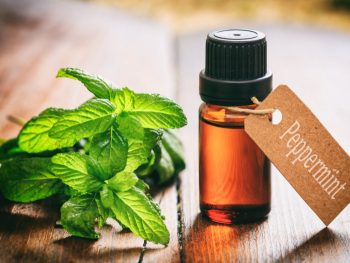June 27th, 2018
Guest writer for Wake Up World
Essential oils are an excellent way to concentrate the benefits of therapeutic herbs, and essential oils for nearly all herbs are available. One of the most beneficial is peppermint oil, which is extracted by steam distillation from the peppermint, or mentha piperita, plant. The primary component of peppermint oil is menthol which provides the familiar flavor and cooling sensation, but peppermint oil also contains various minerals, vitamin A, vitamin C, and fatty acids.
Peppermint oil can be used to help you address a wide range of health ailments, both internally and externally. It’s an ingredient in many lotions and ointments. Topical application can relieve aches and pains, benefit the skin, and a few drops on the wrist is even a common recommendation to relieve a headache. Peppermint oil is commonly used in aromatherapy, many people will inhale the vapors to sooth their respiratory tract and lungs. Peppermint oil also has internal use to combat indigestion and harmful organisms.
Peppermint Oil and Irritable Bowel Syndrome (IBS)
It’s no secret that peppermint oil can relax the smooth muscles of the respiratory tract, but did you know it can do the same to the smooth muscles in your GI tract? [1] There are many OTC remedies for symptoms of IBS and many of them contain peppermint oil, with good reason. The Department of Complementary Medicine at the University of Exeter in the UK examined over a dozen studies that collectively indicated peppermint oil was effective at relieving IBS symptoms. [2] Much evidence suggests that, when compared to available drugs for IBS, peppermint oil may be the best choice to alleviate symptoms and improve quality of life for IBS patients. [3]
Peppermint Oil and Harmful Organisms
Many essential oils are known to be resistant to most harmful organisms. Peppermint oil is no exception and its menthol content has even been found to be effective against mosquitos and head lice. [4] [5]
Peppermint Oil and Bacteria
Peppermint oil is toxic to bacteria by way of chemicals which have antioxidant potential. [6] When evaluated for resistance to bacteria, peppermint oil and its components: camphor, menthol, and carvacrol have been found to be effective; notably, carvacrol has the highest activity. [7] [8] Other studies have evaluated and confirmed the antioxidant and potential of peppermint oil and a Syrian study even found peppermint oil to be effective against a strain of microbes known to target livestock. [9] [10]
Peppermint Oil and Fungus
The general resistance of essential oils to fungus is well documented and peppermint oil is no exception. Indian and Iranian researchers have shown that peppermint oil holds potential for managing fungal infections, including candida. [11] [12] Their assertion was backed up by the Institute for Biological Research in Serbia where researchers observed fungicide behavior from peppermint oil. [13] The Tehran University of Medical Sciences in Iran also, after comprehensive review, concluded that menthol is resistant to fungus, including candida. [14] Similarily, Brazil’s State University of Campinas found essential oils of three different peppermint varieties to be anti-candida. [15]
One of the most positive discoveries about peppermint oil was found by the US Air Force 375th Medical Group Family Medicine Residency Program who conducted a study of 18 participants suffering from fungal nail infection. During the 48 week study, the participants applied a vapor rub that contained menthol to their nails. All 18 reported positive changes to their nail appearance by the end of the study. [16]
References:
- Grigoleit HG, Grigoleit P. Gastrointestinal clinical pharmacology of peppermint oil. Phytomedicine. 2005 Aug;12(8):607-11. Review.
- Pittler MH, Ernst E. Peppermint oil for irritable bowel syndrome: a critical review and metaanalysis. Am J Gastroenterol. 1998 Jul;93(7):1131-5.
- Grigoleit HG, Grigoleit P. Peppermint oil in irritable bowel syndrome. Phytomedicine. 2005 Aug;12(8):601-6. Review.
- Talbert R, Wall R. Toxicity of essential and non-essential oils against the chewing louse, Bovicola (Werneckiella) ocellatus. Res Vet Sci. 2012 Oct;93(2):831-5. doi: 10.1016/j.rvsc.2011.11.006. Epub 2011 Dec 15.
- Samarasekera R, Weerasinghe IS, Hemalal KP. Insecticidal activity of menthol derivatives against mosquitoes. Pest Manag Sci. 2008 Mar;64(3):290-5.
- Sharafi SM, Rasooli I, Owlia P, Taghizadeh M, Astaneh SD. Protective effects of bioactive phytochemicals from Mentha piperita with multiple health potentials. Pharmacogn Mag. 2010 Jul;6(23):147-53. doi: 10.4103/0973-1296.66926.
- Sokovi? M, Glamo?lija J, Marin PD, Brki? D, van Griensven LJ. Antibacterial effects of the essential oils of commonly consumed medicinal herbs using an in vitro model. Molecules. 2010 Oct 27;15(11):7532-46. doi: 10.3390/molecules15117532.
- Hussain AI, Anwar F, Nigam PS, Ashraf M, Gilani AH. Seasonal variation in content, chemical composition and antimicrobial and cytotoxic activities of essential oils from four Mentha species. J Sci Food Agric. 2010 Aug 30;90(11):1827-36. doi: 10.1002/jsfa.4021.
- Mimica-Duki? N, Bozin B, Sokovi? M, Mihajlovi? B, Matavulj M. Antimicrobial and antioxidant activities of three Mentha species essential oils. Planta Med. 2003 May;69(5):413-9.
- Al-Mariri A, Saour G, Hamou R. In vitro antibacterial effects of five volatile oil extracts against intramacrophage Brucella abortus 544. Iran J Med Sci. 2012 Jun;37(2):119-25.
- Saharkhiz MJ, Motamedi M, Zomorodian K, Pakshir K, Miri R, Hemyari K. Chemical Composition, Antifungal and Antibiofilm Activities of the Essential Oil of Mentha piperita L. ISRN Pharm. 2012;2012:718645. doi: 10.5402/2012/718645. Epub 2012 Dec 13.
- Pattnaik S, Subramanyam VR, Bapaji M, Kole CR. Antibacterial and antifungal activity of aromatic constituents of essential oils. Microbios. 1997;89(358):39-46.
- Sokovi? MD, Vukojevi? J, Marin PD, Brki? DD, Vajs V, van Griensven LJ. Chemical composition of essential oils of Thymus and Mentha species and their antifungal activities. Molecules. 2009 Jan 7;14(1):238-49. doi: 10.3390/molecules14010238.
- Azimi H, Fallah-Tafti M, Karimi-Darmiyan M, Abdollahi M. A comprehensive review of vaginitis phytotherapy. Pak J Biol Sci. 2011 Nov 1;14(21):960-6. Review.
- Duarte MC, Figueira GM, Sartoratto A, Rehder VL, Delarmelina C. Anti-Candida activity of Brazilian medicinal plants. J Ethnopharmacol. 2005 Feb 28;97(2):305-11. Epub 2005 Jan 5.
- Derby R, Rohal P, Jackson C, Beutler A, Olsen C. Novel treatment of onychomycosis using over-the-counter mentholated ointment: a clinical case series. J Am Board Fam Med. 2011 Jan-Feb;24(1):69-74. doi: 10.3122/jabfm.2011.01.100124.
Recommended articles by Dr. Edward Group:
- The 9 Best Fermented Foods for Your Gut
- 14 Foods that Cleanse the Liver
- Top 5 Foods for the Pineal Gland
- The Importance of a Kidney Cleansing Diet
- The 9 Best Herbs for Lung Cleansing and Respiratory Support
- 7 Best Foods to Support Kidney Function
- Lung Cleansing With Peppermint Oil
- 20 Health Benefits of Fasting for Whole Body Wellness
- How Fluoride Damages Pineal Gland Health
- Toxin Cleanse: Which Toxins Are Disrupting Your Health?
- 10 Uses for Organic Oregano Oil
About the author:
Dr. Edward F. Group III (DC, ND, DACBN, DCBCN, DABFM) founded Global Healing Center in 1998 with the goal of providing the highest quality natural health information and products. He is world-renowned for his research on the root cause of disease. Under his leadership, Global Healing Center earned recognition as one of the largest natural and organic health resources in the world. Dr. Group is a veteran of the United States Army and has attended both Harvard and MIT business schools. He is a best-selling author and a frequent guest on radio and television programs, documentary films, and in major publications.
Dr. Group centers his philosophy around the understanding that the root cause of disease stems from the accumulation of toxins in the body and is exacerbated by daily exposure to a toxic living environment. He believes it is his personal mission to teach and promote philosophies that produce good health, a clean environment, and positive thinking. This, he believes, can restore happiness and love to the world.
For more, please visit Global Healing Center.

If you've ever found value in our articles, we'd greatly appreciate your support by purchasing Mindful Meditation Techniques for Kids - A Practical Guide for Adults to Empower Kids with the Gift of Inner Peace and Resilience for Life.
In the spirit of mindfulness, we encourage you to choose the paperback version. Delve into its pages away from screen glare and notifications, allowing yourself to fully immerse in the transformative practices within. The physical book enriches the learning process and serves as a tangible commitment to mindfulness, easily shared among family and friends.
Over the past few years, Wake Up World has faced significant online censorship, impacting our financial ability to stay online. Instead of soliciting donations, we're exploring win-win solutions with our readers to remain financially viable. Moving into book publishing, we hope to secure ongoing funds to continue our mission. With over 8,500 articles published in the past 13 years, we are committed to keeping our content free and accessible to everyone, without resorting to a paywall.









